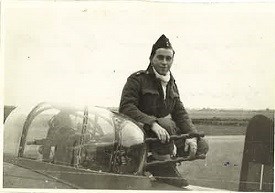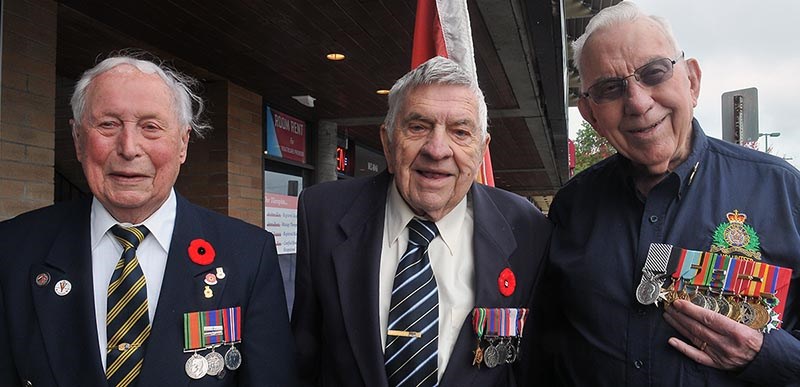About 1,500 students at Dr. Charles Best secondary had a living history lesson this morning (Thursday) to launch the Remembrance Day long weekend.
Maria Bruneau and other social studies teachers at the Coquitlam school organized the service, with the help of Coquitlam Legion member and retired UN peacekeeper Bob Sutherland, to talk about the military service of some Coquitlam veterans, including three men who saw action during the Second World War.
Their black-and-white photos from the mid 1940s — when they were only a couple of years older than the Best students they spoke to Thursday — as well as images of their service medals (including honours from France and the Netherlands) were projected before the school assembly. Afterward, students got a chance to speak with the vets and to shake their hands.
"The kids are so interested in their stories," Bruneau said. "They want to take it all in and thank them for what they did for Canada."
The three featured WWII vets — longtime Coquitlam residents Norm Bonin, Russell Hellard and John 'Doc' Cumbers — say they enjoy getting out to the schools around Nov. 11 to share their war tales and talk about the sacrifices made.
"We want to make them aware of what our contributions were and hope this doesn't happen again," Bonin said during an interview with The Tri-City News at the Coquitlam Legion branch.
Their stories are vital as the number of WWII vets is shrinking, Bruneau and Sutherland said. According to Veterans Affairs Canada, there were about 88,400 WWII vets still alive in 2014, most over 90, and at least 50 of them die every day.
But while the vets like to pay homage to their fallen comrades, they don't like to go into specifics about their efforts; rather, they speak about the lead-up to their service and what happened afterward.
Bonin was 19 in 1940 when he enlisted with the Royal Canadian Air Force. He was interested in aviation and took his ground training in Vancouver and St. Thomas, Ont., where the then-New Westminster resident gained skills as an aero-engine mechanic.
In 1943, Bonin was sent to England to service the Halifax and Lancaster bomber planes for the Allied squadrons based out of Durham and Yorkshire. Although away from the battlefield, aircraft maintenance is considered a front-line service, Sutherland said, as the personnel were the first to see the crews when they left and when they returned.
There were plenty of hazards associated with the work, the 96-year-old Bonin said. One night, German planes swooped down on their Yorkshire airfield and knocked out a plane. "Everybody was issued with a rifle in case they came in for more," he said.
After D-Day, Bonin returned to Canada to prepare for the Tiger Force in Okinawa when, during his training in Yarmouth, N.S., he got the news.
"We didn't get to go because of the atomic bomb," he said, referring to the Hiroshima explosion on Aug. 6, 1945.
Hellard was on active duty in Darwin, Australia, when his mission came to a halt.
He'd enlisted in Toronto, following in the steps of his two brothers, and did his basic military training in northern Ontario. There, he was asked to join the Royal Canadian Corps of Signals and, soon, was in "dots and dashes" training in Kingston.
Hellard trained more in Victoria before getting on a hospital ship for a 30-day voyage to Australia, where a signals Allied camp was set up to aid war efforts in the Pacific.
Now, the 93-year-old writes about veterans' experiences and runs a group out of the Dogwood Pavilion seniors' centre in Coquitlam. He has also appeared at Remembrance Day assemblies at Banting middle and Centennial secondary schools.
The most decorated of the three, John 'Doc' Cumbers was only 17 when he enlisted with the RCAF in Winnipeg (he wanted to get into the navy but, because officials knew the sea cadet's true age, he was rejected).
His parents were involved in war efforts — his dad was a First World War army vet, his mom handled military mail — and his older brother was in the RCAF. He trained around the east coast, receiving his wings from Canadian WWI ace Billy Bishop before being sent to England in 1943 as a gunner.
Between December of that year and October 1944, Sgt. Cumbers successfully flew 39 trips, including on D-Day, on June 6, 1944. Last year, Cumbers was honoured by the French government with that country's highest military medal: the Legion d'Honneur.

When WWII ended, Cumbers signed up to serve with the Royal Canadian Navy and, after discharge, he became a Vancouver firefighter for 32 years, retiring in 1985.
Today, the 92-year-old Cumbers — who has a great-grandson in the same RCAF squadron with which he served — spends part of his Mondays and Fridays volunteering at the Coquitlam RCMP community police station on Ridgeway Avenue.
"I like to give back to my community and I like talking with the kids about the war," Cumbers said, adding: "History is something we shouldn't forget."



